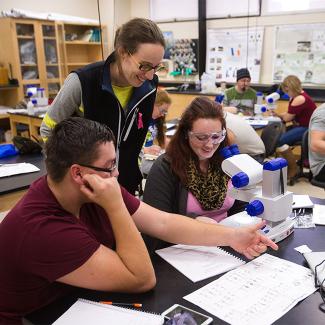What you'll learn studying Pre-Cytotechnology at UW-Platteville
Discover the secrets of cell structure and function through the Pre-Cytotechnology program offered by the University of Wisconsin-Platteville Department of Biology. A pre-cytotechnology degree allows you to apply your skills in microscopy and staining techniques to determine aberrations in cellular structures, aiding in the diagnosis process. While cytotechnologists are often integral members of the healthcare team, they can also work as health educators, laboratory managers and administrators, or researchers in this growing field.
UW-Platteville offers a three plus one (3+1) articulation with the UW-Madison School of Cytotechnology and State Lab of Hygiene. Pre-cytotechnologist degree requirements for students pursuing the 3+1 program include completing three years of coursework at UW-Platteville for admission to these programs or other professional schools.
Outside the classroom, you can build on your experience through student clubs and organizations, or undergraduate research. Plus, we offer a wide variety of campus support programs like STEM Living Learning Communities and mentoring, which allow you to create a student experience unique to you and your goals.
Careers in Cytotechnology
Cytotechnologists study cells from the human body to identify cellular changes that may indicate malignant or benign diseases and disorders. Cytotechnology helps healthcare professionals detect viral infections, bacterial infections, as well as cancers and other abnormal conditions. Pursuing this field of study will help you develop a variety of skills including the use of current technologies, observation techniques, scientific inquiry, and more. These skills will, in turn, prepare you for a variety of exciting roles.
Some of the careers you may consider with this degree include:
- Biological technician
- Cytotechnologist
- Histology technician
- Laboratory manager
- Laboratory supervisor
- Medical equipment sales
- Medical laboratory scientist
- Pharmaceutical representative
- Researcher
Cytotechnologists typically spend most of their time using microscopes and other equipment and technologies. Cytotechnologists generally work closely with pathologists. While many people who pursue degrees in pre-cytotechnology work in the healthcare industry in hospitals or diagnostic laboratories, you can also find careers in this field within government agencies, research organizations, universities, and more.

Discover by doing
At UW-Platteville, students studying pre-cytotechnology learn in the classroom and laboratory, but also have numerous experiential learning opportunities. Choose from research, internships, university events, and other programs designed to enhance your college experience and prepare you for your future career.
Learn more





